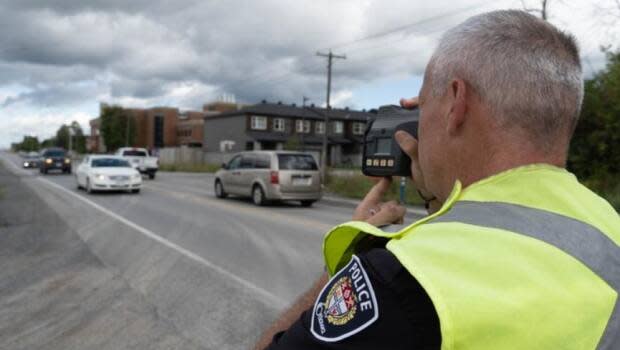Speed limit could drop on deadly stretch of March Road

UPDATE: Ottawa city council approved this speed limit change at its May 10 meeting without discussion.
Ottawa city council will spend some of Wednesday's meeting debating the idea of dropping the speed limit on a busy stretch of March Road in Kanata that's been the site of fatal collisions.
Nearby residents have been calling for the change for years, though city staff counter it will make little difference unless it comes with a police crackdown on speeding.
The transportation committee recommended lowering the limit between Teron Road and Carling Avenue from 80 km/h to 60 km/h.
The stretch has a much higher number of crashes, injuries and deaths than other parts of March Road, according to a staff report, which links the numbers of incidents to the relatively higher concentration of shops and foot traffic in the area.
A vehicle struck and killed a pedestrian there in December 2021. Days later, a van pulling out of a mall was hit and flipped upside down. Years earlier, two people died in a crash on the same stretch.
According to the most recent city data from 2019, a total of 26 collisions were reported there during that year, up from 24 the year before.
'A big wake-up call'
Neil Thomson, president of the Kanata Beaverbrook Community Association, called safety on the stretch of road a "chronic problem," particularly for cyclists.
He witnessed the aftermath of a highly-publicized 2009 collision on March Road just north of this stretch where the driver of a van struck five cyclists, seriously injuring four.
"That was a big wake-up call," said Thomson, noting the area has only become busier with new development drawing more traffic.
"Anything to cause people to pay attention and slow down on that stretch would be very welcome."

Robert Wein, who sustained a serious brain injury from the 2009 collision, has no memories of the crash. He called the speed limit reduction a good idea that could prompt drivers to pay attention to the risks in the area and improve safety for cyclists.
"I think the city is starting to pay attention," he said.

Playing Frogger
The councillor for the area, Cathy Curry, backs the proposed change to 60 km/h. Neighbouring businesses are also supportive.
Delaney Tolle, assistant manager at the nearby Royal Oak, has seen the wreckage that followed several crashes.
She said pedestrians sometimes attempt Frogger-style crossings, weaving through heavy traffic like the frog in the vintage arcade game.
Though she supports the proposed move, she thinks any speed limit changes would have to be "seriously enforced."
"It'll never happen," Tolle said of potential compliance. "People like to drive as fast as they can."
City staff have similar doubts. Surveys show speeds are now around 76 km/h and the road looks and feels like it's fit for that speed.
"Most motorists will continue to drive at speeds they feel are reasonable and prudent unless continual police enforcement is present," the report said.

Traffic calming measures wouldn't be appropriate on the stretch, it added, and staff argue only "considerable police enforcement" on an ongoing basis would make a difference.
Thomson said he would like to see a speed camera installed on the stretch of road and lowering the speed limit should be the first move.
"I don't think you could find anyone in this community that will say no," he said.


